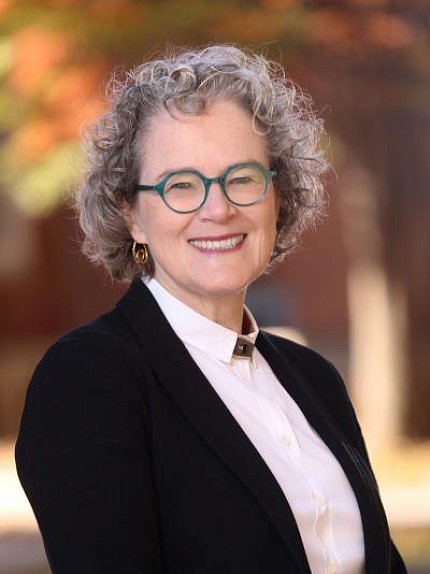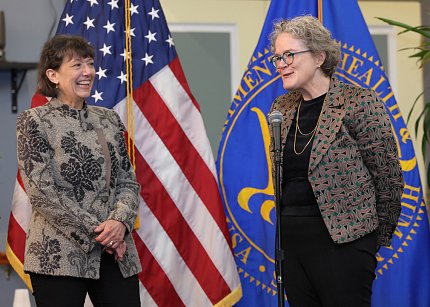Beyond the Drugs
New NIAID Director Discusses Goals

A new leader is at the helm of NIAID. Dr. Jeanne Marrazzo became the sixth director of the National Institute of Allergy and Infectious Diseases in September 2023. She joined NIAID from the University of Alabama at Birmingham, where she was director of the Division of Infectious Diseases.
The transition from Alabama to Maryland has been smooth, she said. “People are very welcoming here—I can’t say enough good things about the [NIH community].”
The pace of life is faster in Maryland, though, she noted: “People walk [much] faster here.”
Marrazzo is no stranger to the research infrastructure at NIH, having been a principal investigator on NIH grants continuously since 1997. She’d had a distinguished career in academic medicine leading to her candidacy and selection for the NIAID directorship.
“I’m thrilled to be here [and have this opportunity] to serve my country,” she said.

Photo: Chia-Chi Charlie Chang
Her research has focused on sexually transmitted infections (STIs), with an emphasis on women’s health. She became involved in HIV research early in her career, and quickly began to expand her focus into other STIs.
An infectious disease fellowship opened her eyes to the gender disparities in STI research and treatment.
“It became clear to me that not only did people not talk about STIs very much, but the impact [of the disorders] was much more profound on women’s genital tracts,” Marrazzo explained. “And, the health effects may not be noticeable [until later in life].”

Photo: Chia-Chi Charlie Chang
As NIAID director, Marrazzo is eager to bring her perspective to the table. One of her favorite parts of the week, she shared, is the institute and center directors’ meeting, where she and her counterparts get to collaborate on initiatives. This spirit of community factors into her vision for NIAID.
“By focusing so much of our research on the ‘bugs,’ we’ve missed [seeing] the whole person,” she said.
Support for people with HIV, for example, requires mental health care as well as targeted treatment for the virus. In order to have a more inclusive, whole-person approach to research, she said, we need to “consider how people really live.”

Photo: Chia-Chi Charlie Chang
Marrazzo is also looking forward to issuing NIAID’s strategic plan this year. The institute hasn’t released one since before the Covid-19 pandemic, so Marrazzo sees this as “a real chance to shake things up and ask ourselves hard questions.”
As the first woman appointed to the NIAID directorship, Marrazzo is very aware of the need to foster inclusivity at NIH and beyond. She has observed improvements in gender parity and racial representation in clinical trials and wants to do more to hold grantees accountable.
“When you diversify the people in the room, you invite in viewpoints that weren’t there before,” she said. “You can’t help but be positive about it.”
